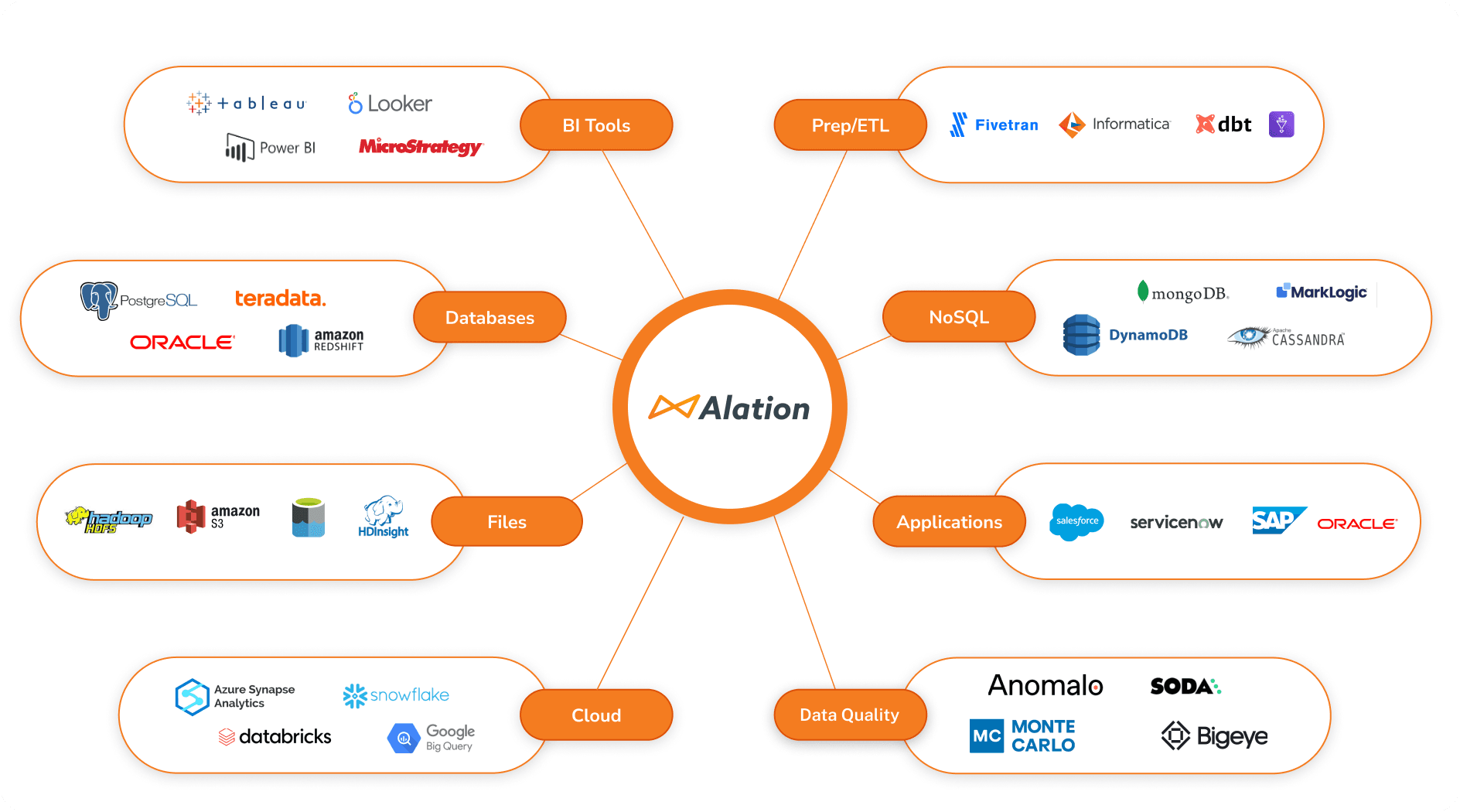Get value from your data without sacrificing safety
Your teams need data to make decisions. But balancing data access with compliance is a challenge, often leading to restrictive policies that slow innovation and compromise long-term competitiveness. With Alation’s people-first approach, you can align data governance with business goals and measurable ROI. Enable teams to use data quickly and confidently while staying compliant, turning data governance from a blocker into a strategic advantage that drives results.
Turn data governance into a strategic advantage
Eliminate data silos
Bring all your metadata together in one place. Alation breaks down barriers between systems and departments, creating a single source of truth with data that’s easy to access, share, govern, and use across the organization.
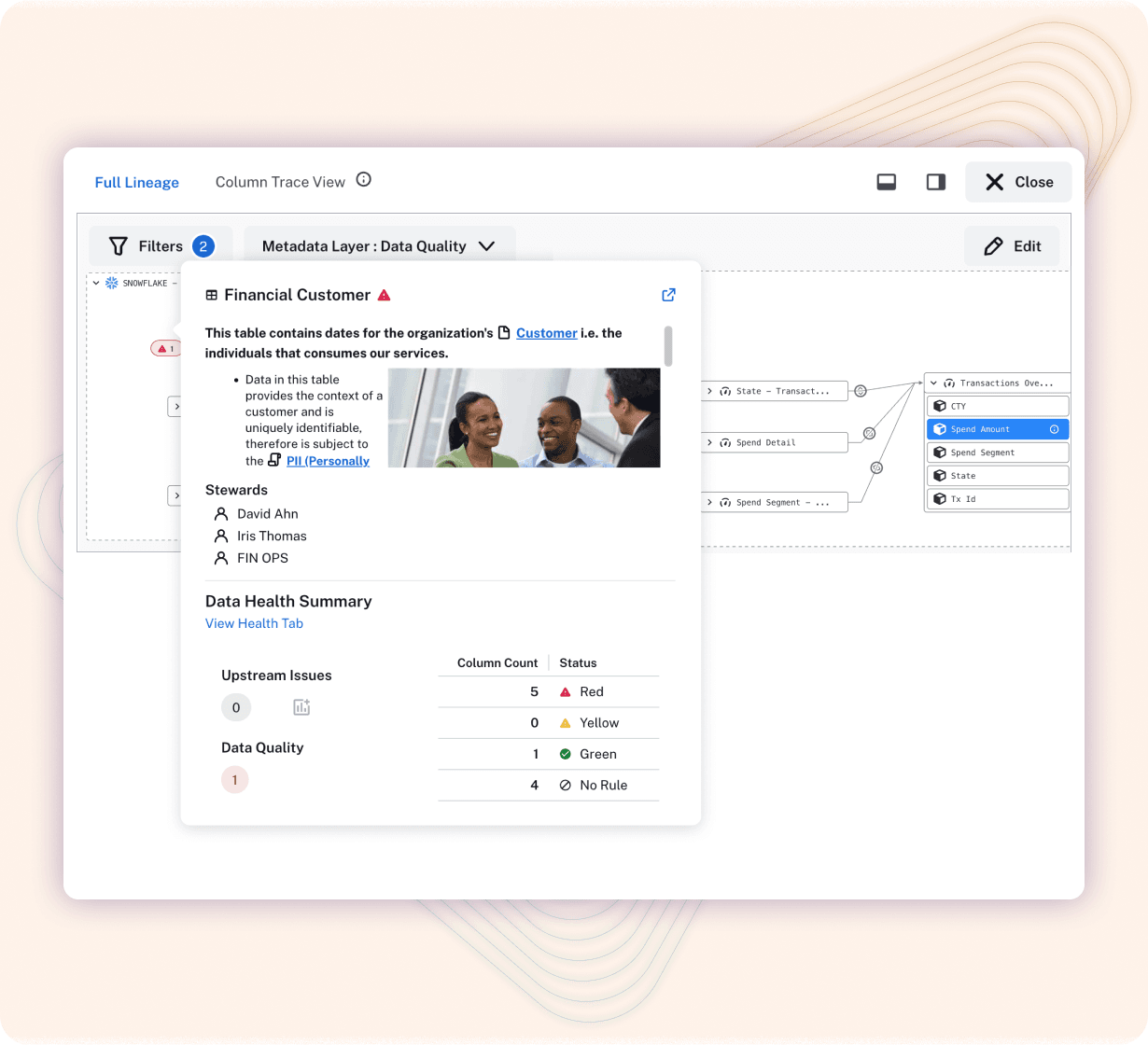
Stay compliant with evolving regulations
Alation’s automated workflows and policy management tools ensure your data governance stays updated, minimizing risk and keeping your organization aligned with the latest requirements.

Ensure high-quality data
Maintain data integrity across systems. Alation’s data lineage, curation tools, and quality controls ensure your teams always work with accurate and trusted data for better decision-making.


"By improving the speed at which we are able to acquire and use data, we can turn that saved time into product innovations that help us remain No. 1 in customer satisfaction and delivering personalized customer experiences."
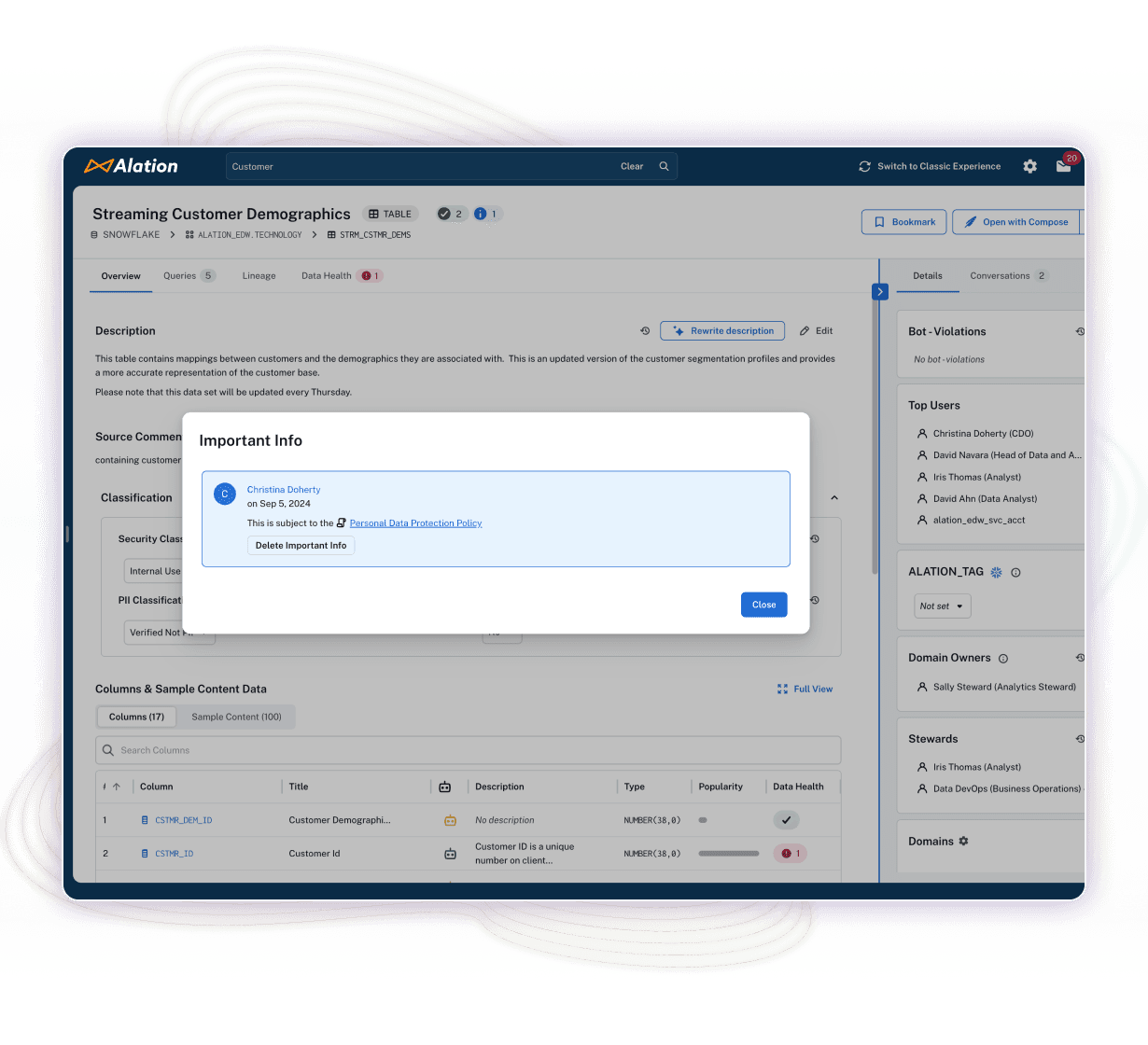
Ensure compliance without slowing teams down
Curate data faster
Generate suggested descriptions that help your teams quickly find and understand the data they need.
Guide users to handle data safely
Trust Flags lead users to trusted data with linked policies, ensuring they use the right information compliantly.
Protect sensitive data
Apply row-level access controls and dynamic masking to safeguard sensitive information and ensure compliance.
"Alation is where we can integrate all aspects of data governance – not just cataloging the information, but driving policies and providing a place for people to collaborate."
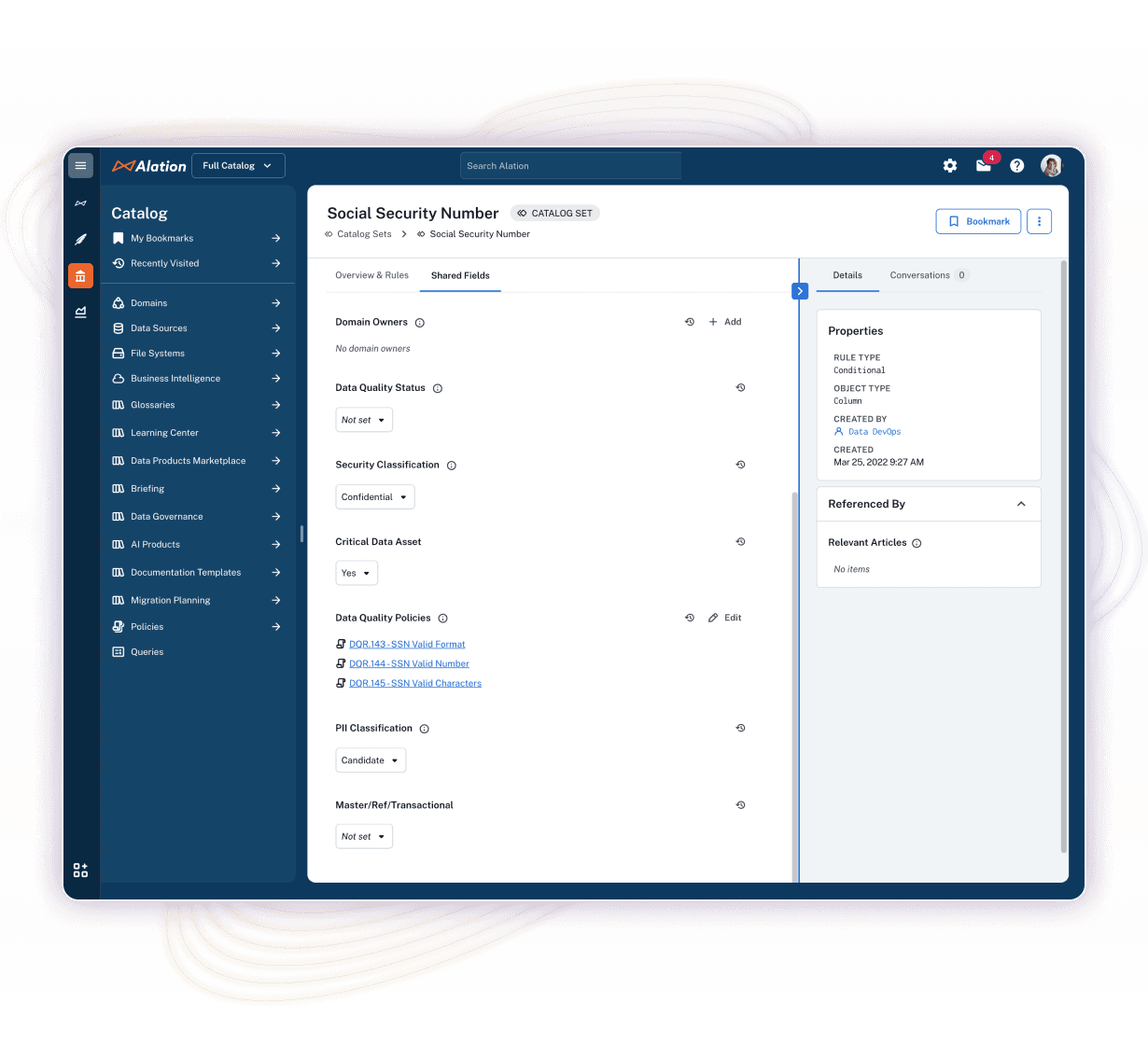
Manage risk and compliance at scale
Centralize your policies
Keep all policies organized and accessible in the Policy Center to help teams stay compliant.
Automate compliance tasks
Assign and track tasks like policy updates and renewals with Workflow Automation to reduce manual effort.
Classify data automatically
Use Catalog Sets to classify new data and apply the right policies to reduce risk and keep pace with the flow of data.
"The GDPR requires us to know where our data sits and how it should be processed. Because we store that information in Alation, it becomes much easier for us to be compliant."
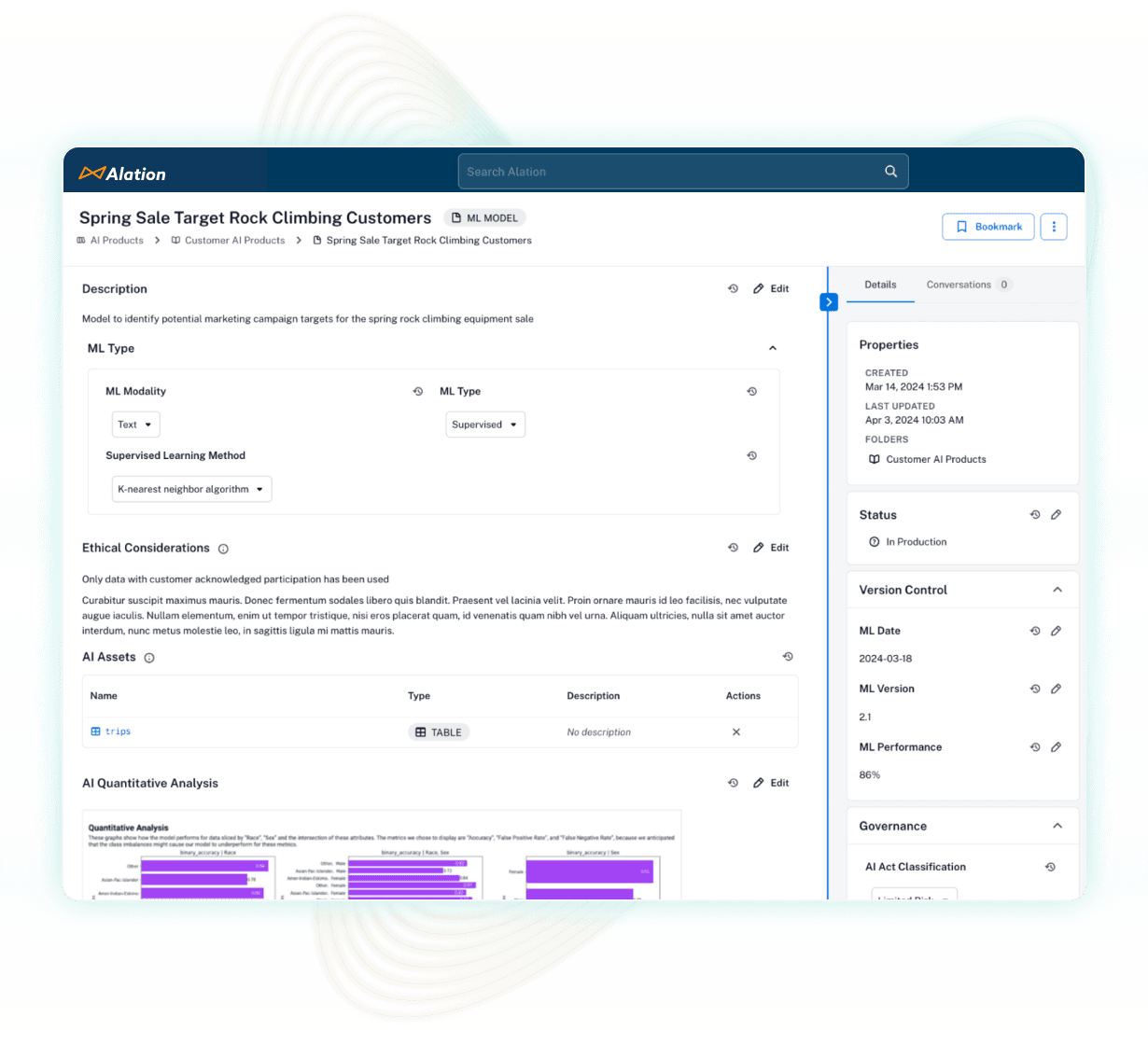
Improve AI safety
Surface trusted data for AI
Build AI models with reliable, high-quality data and clear lineage, ensuring full traceability and confidence in outcomes.
Maintain ethical AI practices
Future-proof your AI models and datasets to promote ethical, safe, auditable, and compliant practices.
Promote AI transparency
Track and document your AI models. Give stakeholders visibility into model types, training data, and compliance with ethics policies.
"As we incorporate our data into AI models, Alation plays a big role in ensuring we have a full, transparent understanding of our data assets, the user rights attributed to the assets, the lineage, and the reliability and quality of the data."
Everything you need to get more from your data without compromising compliance
Find data in seconds, not hours
Find the data you need with intuitive search and discovery that guides users toward the most trusted assets.
View data lineage end to end
See your data’s journey from source to destination, including everything that’s happened along the way.
Curate your catalog with AI
Let ALLIE AI recommend metadata descriptions and efficiently populate your data catalog.
Automate data management
Automatically add new assets to your data catalog as they’re created. Workflow Automation improves metadata quality, consistency, and compliance.
Publish trusted SQL queries
Let teams access and reuse pre-approved SQL queries. This lets everyone self-serve, frees experts from repetitive questions, and speeds up everyone's work.
Connect to any data quality tool
Integrate with your preferred data quality software using Alation’s Open Data Quality Framework. Alation aggregates the results into a single system of record so you can see everything in one place.
Bring data into your favorite tools
Let teams bring trusted data into the apps they use daily with Alation Anywhere. Search, share, and take action on data assets within Excel, Teams, Slack, and more.
Track data usage
Tracking the value of data products is key, especially if you use a data mesh approach. Use Alation Analytics to discover which data products are most popular and which are safe to retire.
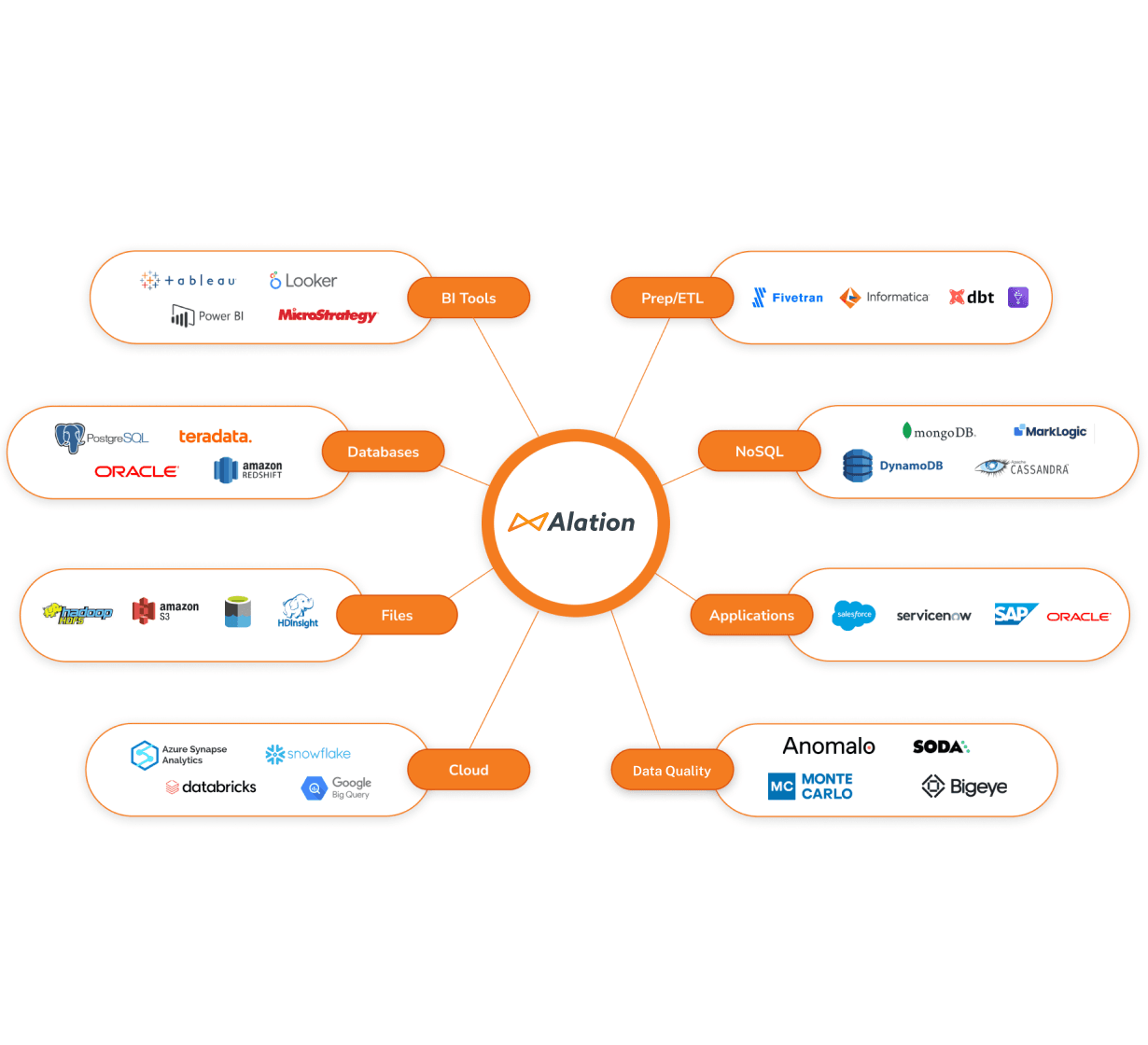
Easy deployment. Fast ROI.
Simple integrations for IT
Get 120+ pre-built connectors to data sources, BI systems, file systems, applications, and more.
Jumpstart your project with our Right Start program
Our experts guide the way with specialized programs for self-service analytics, cloud modernization, and data governance.
Grow adoption with expert guidance
Gain access to a team of data experts who help you every step of the way, from onboarding to organization-wide use.
FAQs about data governance
Data governance defines how data should be gathered and used within an organization.
Businesses can balance compliance and innovation by embedding governance into day-to-day data use. A modern data governance platform enforces security and regulatory requirements automatically while empowering users to discover and use trusted data. This prevents “top-down governance” and instead creates an environment where teams can innovate responsibly with confidence. Importantly, governance has evolved beyond being a defensive, compliance-only function. Today, it serves as an offensive business strategy that enables agility, efficiency, and value creation. By aligning governance with business objectives, organizations can both safeguard sensitive information and accelerate digital transformation.
A comprehensive solution includes policy management, access controls, workflow automation, stewardship tools, lineage tracking, and monitoring for compliance. It should also integrate with or be supported by data catalogs and quality solutions to provide full visibility across the data lifecycle.
Governance provides the structure and policies that give meaning to metadata and lineage. While a catalog shows what data exists, governance defines how it should be used, who has access, and how compliance is enforced. Together, these capabilities ensure data is trusted, contextualized, and well-managed.
Modern governance platforms can classify sensitive data automatically, apply masking and access rules, and track usage to maintain audibility. This ensures organizations can prove compliance with privacy laws while still enabling secure access for analytics and AI initiatives.
Data governance is gaining importance as organizations use it for compliance and various use cases including collaboration and discovery. Forrester defines data governance as software and services that help manage data policies, quality, and compliance. Aspects include data definitions, policies, quality, stewardship, literacy, regulatory compliance, ethics, risk management, privacy, security, and end-to-end lifecycle management. It should integrate with an organization's data strategy.
Data governance is the cornerstone of data modernization. At every touchpoint in the data modernization process, you need to know what you have, how it’s classified, and who should access it.
A data catalog is pivotal for implementing data governance and ensuring data democratization.
At the most basic level, data governance promotes behavioral compliance with respect to data. Think of it as a framework for setting clear expectations on how your teams should work with data.
The benefits of data governance in retail is capturing and sharing data ownership, responsibility, and accountability, improving business insights, enabling better decision-making, saving time and driving efficiency, and improving data quality.
Data governance provides guardrails and consistency for retailers by defining how data is gathered and used.
Data governance means putting in place a continuous process to create and improve policies and standards around managing data to ensure that the information is usable, accessible, and protected.
Effective data governance for the public sector enables entities to ensure data quality, enhance security, protect privacy, and meet compliance requirements.

